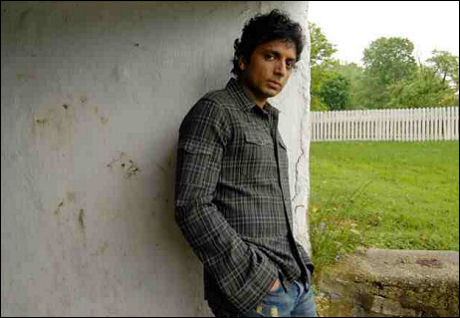The 2008 MTV Movie Awards in two minutes.
Purdum vs. Clinton Spin
“The Comeback Id,” Todd S. Purdum‘s Vanity Fair scathing piece about Bill Clinton, and Clinton’s enraged reaction to it (audio and video). Clinton’s spokesman Jay Carson issued a statement in response to the Huffington Post piece about his comments, to wit: “President Clinton was understandably upset about an outrageously unfair article, but the language today was inappropriate and he wishes he had not used it.”
Just Desserts
The time has come to put away all suspicions and convictions about Hillary Clinton being a conniving sociopath of the first order. Because the game is over and it’s time for unity. But all right-thinking people know who and what she is, and they will pass it along. For she is a liar, and the father of it.
Discarded Man Card
“A national IQ test for women takes place starting tonight — it’s called Sex and the City,” wrote conservative-minded film critic Debbie Schlussel three days ago in a piece called “Hags and the City.” The article was highlighted today (6.2) by the Village Voice‘s Roy Edroso in a column about reactions to the film among right-wing bloggers.
“If you like this TV-show-turned-feature-length-film and you’re female, you failed. If you like it, and you’re a guy, you threw away your man card long ago. You’re not a failure, just gay (like the people who created this show)…not to mention, completely bereft of testosterone.
“A close-up shot of a woman’s pubic hair sticking out of her bathing suit, and another woman defecating in her pants — both are, um, ‘highlights’ of the SATC movie. GUH-ROSS. I thought I was watching a bad, juvenile frat boy movie. This is what substitutes for haute culture for women in America, these days. Very sad. But not as sad and miserable as these four haggish women, who like their former TV show, can’t be called ‘past their prime’ because they never were ‘prime.’ Just primitive…and reliably sleazy and low-class.
“Unfortunately, they’re Delphic oracles to far too many American women, if the long lines of drooling women who packed four large theaters at a promotional screening I attended were any indication.”
Glare
Some “Funny or Die” Sex and the City video, sent by a friend. I’d normally watch it before posting, but try doing that as you’re sitting shotgun in a little subcompact on a Connecticut freeway with the sun in your eyes.
Snapshot
“The DVD is only 10 years old and yet the doom merchants are predicting it could join the likes of VHS tapes – vanishing from high-street stores and household shelves,” reports the Guardian‘s Katie Allen. “With reports that Apple is poised to launch full-length film downloads in Britain and other companies offering their own video-on-demand services, even DVD industry insiders admit the format may eventually die out.
“Yet they argue that the collectability of box sets, the convenience of re-watchable discs and the relatively slow growth of downloads mean there is still plenty of life left in the little silver discs.
“The British Video Association (BVA), which last month celebrated the DVD’s 10-year milestone at a gala dinner complete with metallic dress code, expects to hold more celebrations in a decade’s time. Lavinia Carey, head of the industry group, says that while its research shows the growing popularity of services such as the BBC’s iPlayer and movie downloads on Tiscali, consumers still prefer to own – and give as presents – physical copies.
“Lots of people are getting used to the idea of accessing their content online but there is also this collecting habit,” she says. “There are so many uses for the physical disc that people won’t just drop it like a hot brick. Particularly for TV shows….people love the boxed sets. They love to have the collection and they love to be able to watch it when they want.”
“The BVA concedes that after being largely flat in volume and value terms in recent years, the DVD market is unlikely to see much growth. But digital films will absorb only a fraction of home entertainment spending — about 6% by 2012.
“Screen Digest, a media research firm, predicts that by 2012 digitally delivered films will make up 2.6% of total spending of about 2.2 billion poounds on full-length films.
Changing Lanes

Travelling south on Connecticut 95 — .Monday, 6,2,08, 1:45 pm. First time I’ve posted from a laptop in a speeding car on a freeway, courtesy of ATT Air Card. Plane out of JFK at 7:30 pm, arrives LAX…aahh, doesn’t matter.
Twofer
My son and I bet $20 bucks over this Coco Mademoiselle perfume ad that’s bannered all over Paris. I said it had to be Natalie Portman; he insisted it was Keira Knightley. He turned out to be right, but it is anyone going to tell me they wouldn’t bet on Portman also? Those eyes, the dark hair. At the very least she looks like a hybrid of the two.

Two-Timers
“For what it’s worth, I went with a friend to see Indy 4 again today and I agreed with your post that it’s not a good idea to see it twice,” as film critic friend wrote on 5.31. “It’s far less charming on a second viewing. The second half is particularly leaden.
“Worst of all, now that I’ve really thought about it, is how cheap the skulls are. They look like plastic Halloween shell-out containers stuffed with tin foil. Would it have killed the mighty Lucasfilm empire to cough up the bucks for skulls that actually look like something valuable, maybe carved out of quartz or something? And those CGI gophers are unbelievably bad. How could Caddyshack make a puppet look real in 1980 but Lucasfilm can’t duplicate the feat in 2008?”
Favor Requested
Yesterday a friend of a friend pointed to a quote from The Reagan Diaries (HarperCollins), which went on sale 53 weeks ago: “A moment I’ve been dreading. George [Bush Sr.] brought his ne’er-do-well son around this morning and asked me to find the kid a job. Not the political [son] who lives in Florida — the one who hangs around here all the time looking shiftless. This so-called kid is already almost 40 and has never had a real job. Maybe I’ll call [Michael] Kinsley over at The New Republic and see if they’ll hire him as a contributing editor or something. That looks like easy work.” — entry dated 5.17.86.
Intimations of Doom
Read Allison Hope Weiner‘s 6.2 N.Y. Times story about….well, should we pussyfoot around or should we just say it? The story was clearly inspired by intimations that Weiner (or people she’s spoken to, or both) are picking up on their insect antennae about M. Night Shyamalan and his latest film, The Happening (20th Century Fox, 6.13).

I don’t believe that Weiner and her editors would have run this story — which, if you boil the snow out, basically says “uh-oh, here comes hard-luck M. Night again!” — if uncertainty wasn’t in the air.
I’ve heard the same stuff that Weiner has about the film. Everyone knows what’s (possibly) going on. But it’s not the Times‘ way to peddle non-attributable rumblings so they run a story that reports on Shyamalan’s past troubles and suggests that perhaps…you know…his troubles may not be over. Because…whatever, his karma or his way of making movies (i.e., insisting on writing his own scripts) hasn’t worked in his favor or his relationships with Hollywood mainstreamers have soured, or because…nope, we can’t say it. The most we can do is tap-dance around it. Which is sufficient because the fumes of a story like this say it all.
Shyamalan “has not been able to undo his reputation in Hollywood as a talented filmmaker who will not play by studio rules,” Weiner writes. “After the success of The Sixth Sense, he criticized Disney executives, dared to compare his talent to Steven Spielberg√ɬ¢√¢‚Äö¬¨√¢‚Äû¬¢s and Alfred Hitchcock√ɬ¢√¢‚Äö¬¨√¢‚Äû¬¢s and has steadfastly asserted his reputation as an outsider by refusing to move from Philadelphia to Hollywood.
“His outsider persona continued to work for him, so long as the films The Sixth Sense, Unbreakable and Signs continued to make money. But when his films started to falter at the box office — his last movie, Lady in the Water, was drubbed by critics and ignored by moviegoers — the Hollywood establishment√ɬ¢√¢‚Äö¬¨√¢‚Äû¬¢s support began to wane.
“That failure has put considerable pressure on his new film, The Happening, an R-rated horror movie for Fox that opens on June 13. Another failure would harm the Shyamalan name and make it difficult for him to keep full control over his films.”

